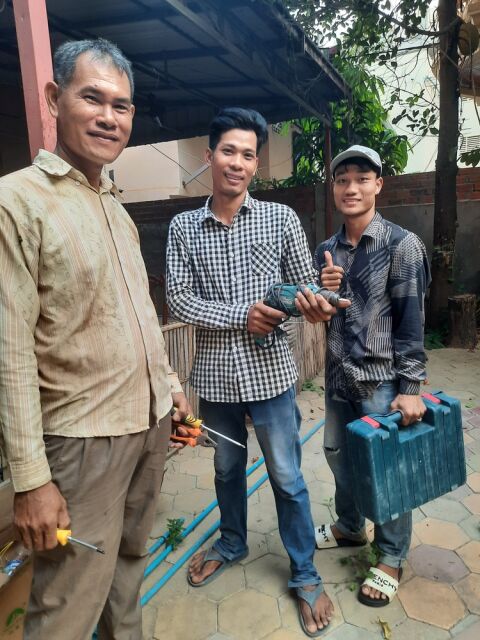Updated:
Many tourists say Cambodian people are nice, easygoing, and friendly. While it is an aspect of the people, there are other points of view. In this post, I would like to introduce an electrician and issues we encounter in Cambodia — or other countries in the region.

Mr Puth Nong (left in the photo) speaks good English, certainly not the best in the town, but we can communicate without issues. He is a good engineer, judging from his works and how he works. He keeps promises, and is on time. He actually replies to your questions in Telegram chat. At the site survey before the deal, he explains what is the root cause, and what needs to be done, or what he would deliver. He listens and understands your requirements, and provides alternative solutions where necessary. He is slightly more expensive than “brothers and sisters” explained later, but it is worth the extra. His team is efficient, and the boss manages the team very well. He has “hire-and-forget” capability, which does not require further guidance after once the deal is made.
All in all, he is the one I am happy to work with. Ask me if you need a good engineer for your business, I’ll share his contact under his permission.
While I am not an electrician, I had been managing various IT vendors and it was my job to assess how they talk and what they promise before making deals.
The background
The reason I introduce him in this post is that I would like to explain issues we encounter — you probably might have known better than I do if you are a business owner — and to promote ones who do business with modern, accepted practices.
Being a tourist is one thing, and living and doing business is another. It is true that Cambodia is business-friendly — licences, visa, regulations, etc — however, business owners often have difficulties here: finding reliable, and competent technicians.
When you have common technical issues, such as plumbing or electronic one, it is not very difficult to find solutions here. It seems that everyone knows someone to fix these issues; “my brother can fix it”.
Brothers and sisters in this context do not necessarily mean real brothers and sisters. They might be a niece or nephew, a son of his friend, someone they know, or even someone they don’t.
A typical case
Here is a typical case. The case is not specific to the country. You most likely have heard of similar stories in other countries in the region.
You ask a technician that someone introduced, to fix an issue. He is supposed to speak English, claimed by the man-in-the-middle. He wants to see what the issue is to estimate the cost and man-hour for the work. He promises to come at 9:00 tomorrow.
He comes to your place with the man-in-the-middle by surprise after an hour — contrary to the promise — just because that time was convenient for him. You interrupt what you are working on at that time, and tries to explain the issue, and find out that his English is slightly better than simple greetings. The man-in-the-middle kindly translates your conversation. You point out that he is not an English speaker, but it is not a problem because “he understands everything”, the man-in-the-middle claims. You are a bit afraid of lost in translation, but you have no other options.
At the end of the discussion, you ask a quote. The quote is sometimes twice or three times more than what you usually expects. When you tell him that the price is bit expensive, the price goes down to slightly more reasonable price without explanation.
On the day of the work, he comes late without notice. When the issue is relatively simple, such as a broken valve, he fixes it. Otherwise, you need to explain your requirements, acceptable solutions, and what you actually need. Again, lost in translation sneaks in. He does what you tell, nothing more or nothing less, even when the solution is not optimal or desired.
After lots of frustrating conversations, the issue is finally gone, or you hope so. If you are not lucky enough, it repeats again. In this process, you are wasting money and — more importantly — time.
Like any other South East Asian countries, many technicians do not speak English; I never met one while I was in Thailand. That is understandable and acceptable. What I don’t like is that they claim they do even when it turns out to be false quickly after a short conversation. I would say they are not lying, but the point is, they are not very honest, either. Some might say I should speak the local language, which is true. However, I deliberately speak English in business and my classes because English comprehension is quite important in modern world, which is particularly true in this country where it relies on foreign tourists, customers, and businesses. It is widely shared among all generations that English skill provides better salary. In IT industry, I never trust those who cannot speak, read, or write English.
Similarly, cheating and double-pricing is not uncommon. They cheat not only tourists but even local customers. “Bellum omnium contra omnes” — the war of all against all in English — is the business practice they know and they have been doing. I know there are exceptions, of course, but they are not the rule.
Modern business entities in this country know better, and are adapting common and accepted business practices now, and we should promote the trend.
For the sake of many guides, and tuk-tuk drivers, I would like to emphasize that it is surprisingly less likely for them to cheat you. Unlike other very touristic towns in the region, — Phuket or Ho Chi Minh City for example — they do know honest services are more profitable in the long term. You would be charged slightly more than local residents — e.g. for local transportation — but I would say it is a fair expectation, and acceptable.
Conclusions
I hope that the post does not sound like just another rant. Instead, we should support and promote local businesses that does the Right Thing ™. I will continue writing similar posts in the future.
